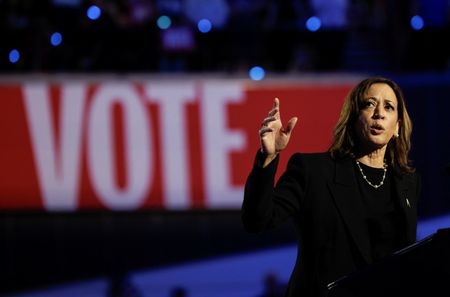By David Morgan
WASHINGTON (Reuters) -U.S. Representative Chip Roy, one of the most prominent hardline Republicans in Congress, pulls no punches when it comes to how frustrated he is about the $1.2 trillion spending package that lawmakers are working to pass before midnight on Friday.
“Everyone that I know and trust about the border, about overall spending, see it as a complete and total failure and a capitulation by Republicans. And (Republican) leadership worked the deal, so it’s on leadership,” Roy told reporters.
“Republicans should reject it,” added the Texas Republican, vowing that he would not back the reelection campaigns of any fellow party member who votes for it.
Roy is part of a small band of hardliners in the Republican-controlled House of Representatives who spent the last 14 months in a bare-knuckle effort to push Congress further to the right, railing against the Democratic-majority Senate and many of their House Republican colleagues.
The House approved the legislation Friday on a 286-134 vote, with more support from Democrats than the majority party, sending it on to the Senate, which would also have to pass it for President Joe Biden to sign it into law.
Passage of the $1.2 trillion bill funding the government through Sept. 30, without any major hardline policy concessions, marks their defeat – for now.
Soon after Republicans took narrow control of the House in January 2023, party hardliners led by members of the House Freedom Caucus began pushing to reset spending to pre-pandemic levels, stop the flow of migrants across the U.S.-Mexico border and end diversity programs in federal agencies, including the Pentagon.
Hardliners shuttered the House floor repeatedly and blocked Republican spending bills they disliked. Ultimately, some of their number ousted Republican House Speaker Mike Johnson’s predecessor, Kevin McCarthy, after he moved a bipartisan stop-gap bill to avert a government shutdown.
But the bill on track to pass follows the broad outlines of a bipartisan spending deal worked out between McCarthy and Biden last May.
In an echo of McCarthy’s ouster last year, the spending bill’s House passage on Friday prompted hardline Representative Marjorie Taylor Greene to introduce a measure to oust Johnson.
Greene, however, said she would not push for an immediate vote. “I filed a motion to vacate today. But it’s more of a warning than a pink slip,” she told reporters.
Hardliners last year also rejected a major bipartisan border bill that would have imposed new limits on immigration, after Republican presidential candidate Donald Trump voiced opposition to it.
House passage of the spending bill provided another illustration of how their tactics undercut their party’s narrow 219-213 majority by forcing Johnson to turn to Democrats to approve the legislation. The bill won the votes of 185 Democrats and 101 Republicans.
Did hardliners achieve any substantial successes during those months of infighting and chaos?
“No,” replied Representative Ken Buck, a hardline Republican who voted for McCarthy’s ouster. “The border is the same, which was the major issue that people wanted policy changes on. And the spending levels are absurd.”
Buck plans to leave Congress on Friday, before the end of his two-year term, blaming a “breakdown in civility.”
DIVIDED GOVERNMENT
House Republican leadership defended the bill as their best option in a divided government, where Democrats hold a Senate majority as well as the White House.
“Seventy percent of the bill is defense, including the largest pay raise our troops have had in decades,” House Majority Leader Steve Scalise, the chamber’s No. 2 Republican, said in response to hardline criticism.
“At a time when the world is on fire more than ever, we need to make sure that we’re properly funding our nation’s defense and supporting our troops, who deserve that pay raise.”
McCarthy’s ouster by eight hardliners, including six Freedom Caucus members, paralyzed the House for weeks in October until Republicans settled on Johnson as a replacement.
In the end, the hardliners said that move hurt their cause.
“It really set us back, and these spending negotiations are indicative of that,” said Representative Byron Donalds, one of roughly three dozen Freedom Caucus members. Like Roy, he voted against McCarthy’s ouster.
Their Democratic colleagues agreed.
“It clearly exposes the Republican caucus for being a very unstable majority, if you can even call it a majority,” said Democratic Representative Gerry Connolly.
Hardliners insist their efforts have been fruitful, saying the current bill keeps nondefense spending flat, targets unspent COVID-19 funds, drains funds earmarked for the Internal Revenue Service and ends taxpayer funding for the main U.N. relief agency for Palestinians in Gaza.
What happens now as the fight over fiscal 2024 spending comes to an end?
“Focus on 2025. We have to start trying to put the genie back in the bottle,” said Donalds.
(Reporting by David Morgan; Editing by Scott Malone and Jonathan Oatis)












